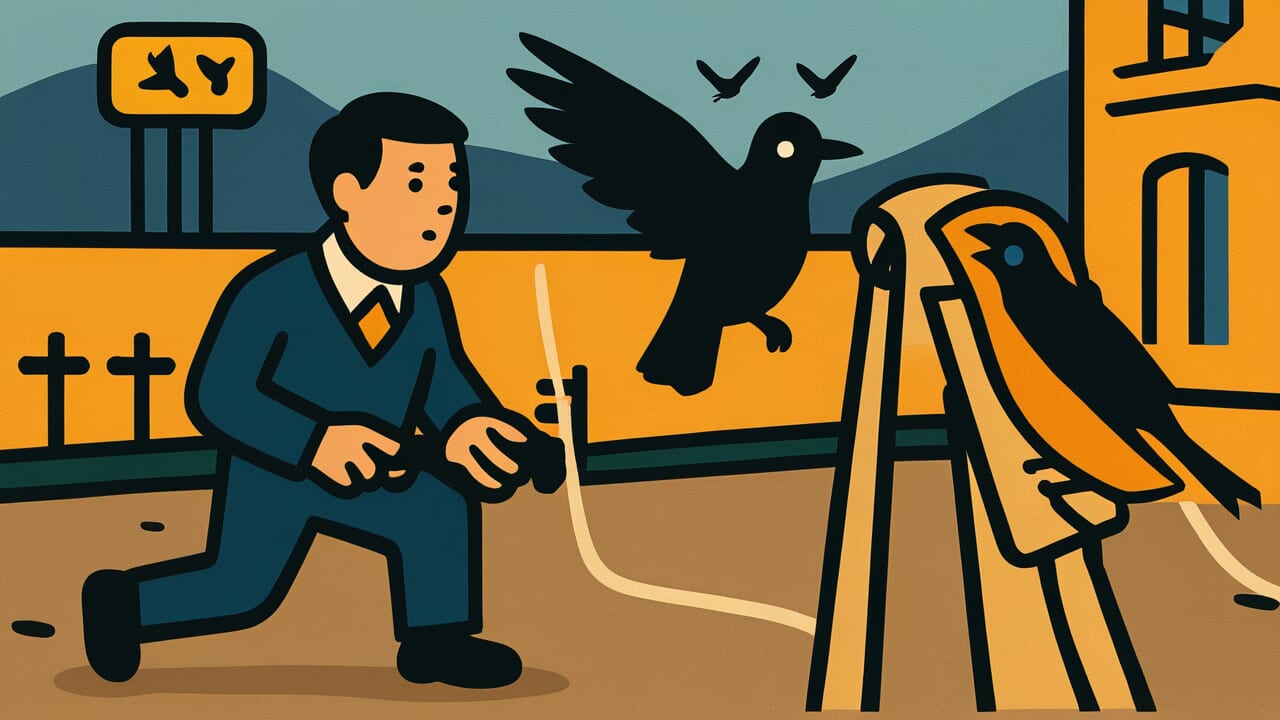How to Read “A blind man may sometimes hit the crow”
A blind man may sometimes hit the crow
[uh BLAHYND man may SUM-tahymz hit thuh kroh]
Meaning of “A blind man may sometimes hit the crow”
Simply put, this proverb means that even people without skill or knowledge can sometimes succeed through pure luck.
The literal words paint a clear picture. A blind person cannot see their target. Hitting a crow would be nearly impossible without sight. Yet sometimes, by pure chance, they might succeed. The deeper message is about the role of luck in life.
We use this saying when someone unexpectedly succeeds despite lacking experience. A new employee might solve a problem that stumped experts. A student might guess the right answer on a test. A person making their first investment might pick a winner. These moments remind us that skill is not everything.
What makes this wisdom interesting is how it balances our view of success. We often think success comes only from hard work and talent. This proverb reminds us that chance plays a bigger role than we like to admit. Sometimes the least prepared person gets the best result.
Origin and Etymology
The exact origin of this proverb is unknown. It appears to be quite old, reflecting a time when hunting birds was common. Many cultures developed similar sayings about unexpected success despite poor odds.
The historical context makes sense for agricultural societies. People regularly hunted for food and knew how difficult it was to catch quick, clever birds like crows. A blind hunter succeeding would truly be remarkable. Such vivid examples helped people remember important life lessons.
The saying spread through oral tradition before being written down. Over time, people adapted it to fit different situations. The core meaning stayed the same while the applications grew wider. Today we use it for any situation where luck trumps skill.
Interesting Facts
Crows have been symbols of intelligence in many cultures for thousands of years. They are actually among the smartest birds, making them particularly challenging targets. This makes the proverb even more meaningful since hitting such a clever creature by accident would be truly extraordinary.
Usage Examples
- After a new intern solved a complex computer problem: “Well, a blind man may sometimes hit the crow. Sometimes fresh eyes see what experience misses.”
- When discussing a lucky stock pick: “My first investment doubled in value, but I know a blind man may sometimes hit the crow. I got lucky, not smart.”
Universal Wisdom
This proverb touches on one of humanity’s most uncomfortable truths: the massive role of chance in our lives. We desperately want to believe that success comes from merit, skill, and hard work. Yet deep down, we know that luck often determines outcomes more than we care to admit.
The psychological need to control our destiny runs deep in human nature. We create elaborate plans, develop skills, and work tirelessly toward goals. This drive helped our ancestors survive harsh conditions and build civilizations. But the same drive makes us uncomfortable with randomness. We prefer stories where the prepared person wins and the lazy person fails. Reality is messier.
The wisdom here is not that skill does not matter. Rather, it reminds us to stay humble about our successes and compassionate about others’ failures. When we succeed, part of it might be the blind man hitting the crow. When others fail, they might have aimed just as well as we did. This understanding can make us more grateful for good fortune and less harsh in judging those who struggle. The proverb preserves an essential balance between confidence and humility that every generation must learn.
When AI Hears This
Lucky people often think they’re naturally gifted at everything. They win once by chance and suddenly believe they’re experts. Meanwhile, truly skilled people watch in frustration as beginners get praised. Society starts thinking success is easier than it really is.
Humans create stories to explain random events that have no real cause. When someone succeeds by accident, everyone invents reasons why it happened. People can’t tell the difference between skill and luck in real time. This makes us terrible judges of who actually knows what they’re doing.
This confusion between luck and skill might actually help humans survive. Overconfident people take more risks and sometimes discover amazing things. Society benefits when people attempt difficult tasks they’re not ready for. The blind man missing ninety-nine crows but hitting one still feeds his family.
Lessons for Today
Living with this wisdom means accepting the complex dance between effort and chance in our lives. The goal is not to become passive or stop trying. Instead, we can hold two truths at once: preparation matters greatly, and luck still plays a significant role. This balance protects us from both laziness and crushing disappointment.
In relationships, this understanding creates more compassion. When someone succeeds quickly while we struggle, remembering the blind man and the crow can ease resentment. When we achieve something others cannot, it can prevent arrogance. We can celebrate wins without assuming they prove our superiority. We can face losses without assuming they prove our worthlessness.
The hardest part is maintaining effort while accepting uncertainty. Our minds want simple rules: work hard and succeed, or be lazy and fail. Reality offers no such guarantees. The wisdom lies in doing our best while staying open to unexpected outcomes. Sometimes we will be the skilled archer who misses. Sometimes we will be the blind man who hits the target. Both experiences teach us something valuable about the mystery of success and the importance of staying humble in an unpredictable world.



Comments